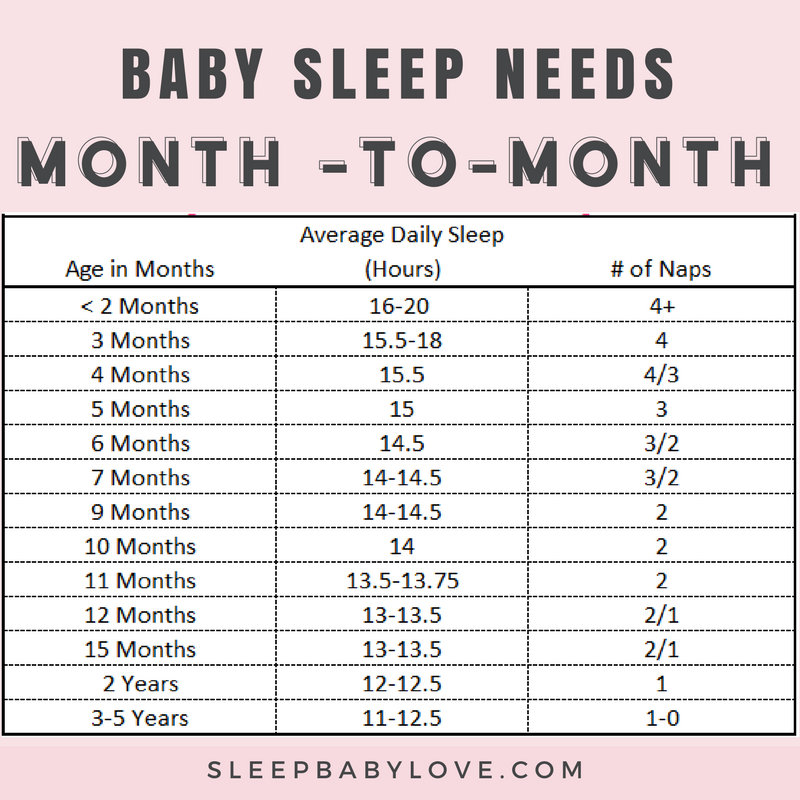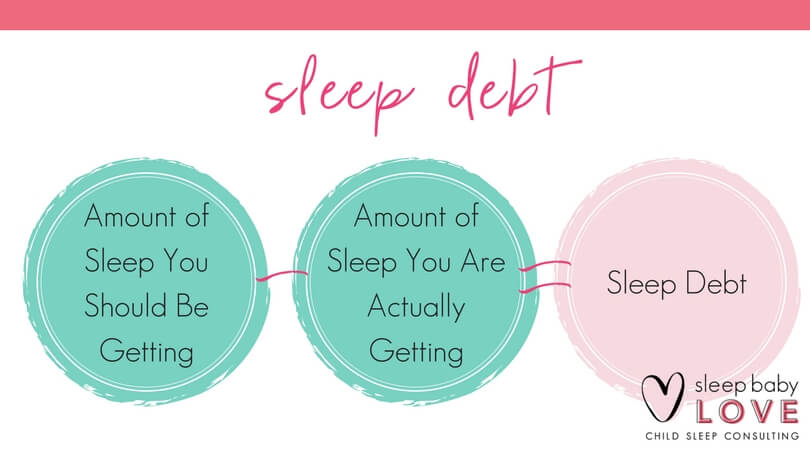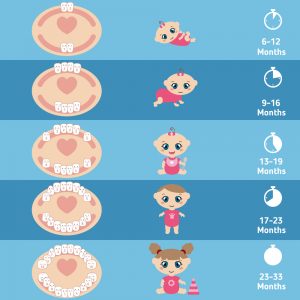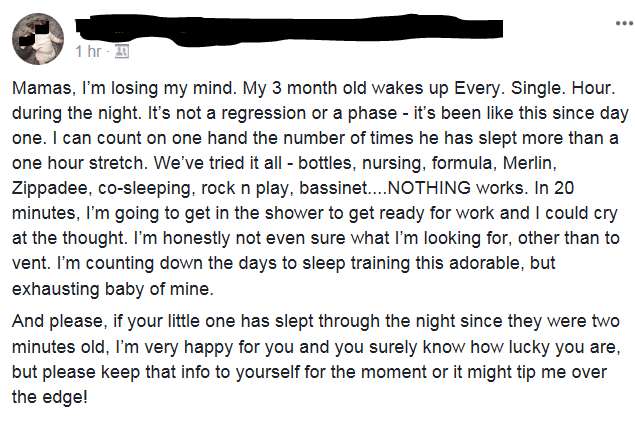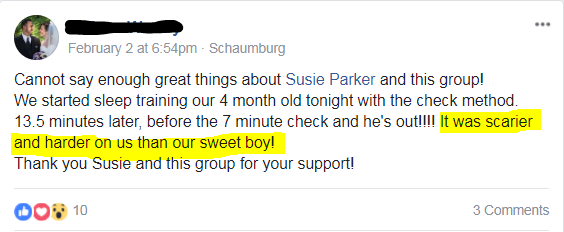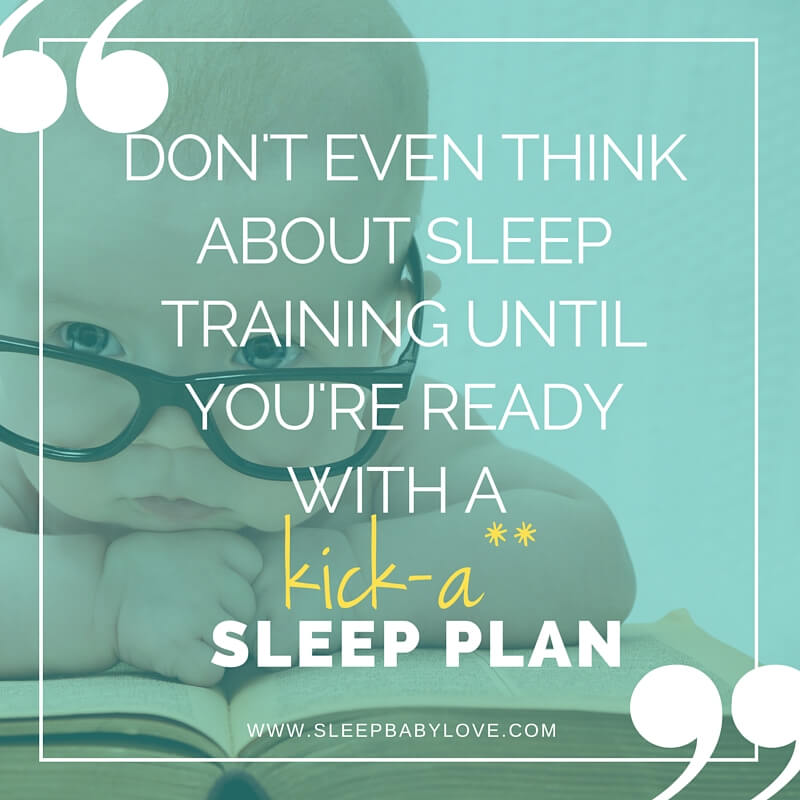8 Sleep Mistakes Moms Make To Get Their Overtired Baby To Sleep (Hint: They Can Harm The Baby And Destroy Their Sleep Routine)
Sleep.
It’s no surprise you’ll do anything to get more of it – especially when trying to get an overtired baby to sleep.
Isn’t it crazy that as moms in our pursuit of getting more sleep, there are things that we are doing that are messing up our ability to get more sleep?
OK, so this is a LONG post (in a good way since it’s researched and actionable).
If you want to jump ahead to the specific mistakes that you’re most interested in, go ahead and click this link:
Mistake #1: Take Terrible Advice From Unqualified Sources
Mistake #2: Not Being Consistent With Your Attempts
Mistake #3: An Overtired Baby Builds A Sleep Debt That’s Hard To Dig Out Of
Mistake #4: Lack of Sleep Can Endanger Your Baby
Mistake #5: Feeding Your Baby To Sleep
Mistake #6: Blaming Everything Else Why Sleep Sucks
Mistake #7: Using Sleep Props and Crutches Getting In the Way
Mistake #8: Not Feeling Comfortable Teaching Your Baby Independent Skills
There are also affiliate links in this post – but only for the products I love and recommend.
Mistake #1: Information Overload: Taking Terrible Advice From Unqualified Sources
Information overload is real.
In today’s technological age, having information at our fingertips is both a blessing and a curse. Yes, we can now consume information quickly and readily with a couple of keystrokes, but all this information that we are eagerly consuming isn’t always the best.
According to Wikipedia, one of the many reasons for information overload is the contradictions and inaccuracies of online information.
The amount of overload can lead to “information anxiety,” which is the gap between the information we understand and the information we think we know. This massive amount of information can impact our decision-making.
No wonder why it’s harder to parent in the digital age!
Everyone has their ideas of what worked or didn’t work for their baby, and everyone has a STRONG OPINION.
The lousy information is sensationalized and pulls at the heartstrings of a parent. It’s tough to decipher what information is right or wrong, mainly because such details will differ for each child.
Facebook is not where you want to go for parenting advice
Forty-four percent of Americans get their news from Facebook, making it easier than ever to crowdsource remedies to fix sleep since many parents are already online. I’ve seen posts like these time and time again in groups focused on moms.
Here’s an example:
“My 9-month-old is still waking up every 2 hours – my pediatrician says to just C.I.O., but I’m not sure I can do it.”
The responses are across the board and look like this:
- “I never let my baby C.I.O., and they slept through the night at 12 months.”
- “Co-Sleep – that’s what works for us – both my kids are in my bed each night, and I love the snuggles.”
- “Get a new doctor – your baby is trying to tell you something if they are waking at night – you need to tend to your baby’s needs.”
- “I let my baby cry at six months, and my babies are amazing sleepers.”
How can anyone sane feel good with responses that are so varied like that?
Answers like these are enough to make anyone’s head hurt and cause this poor mom to become more confused.
The problem with finding information online is that bad information, even hurtful information, can be doled out.
If information overload can impact our ability to make decisions and remain productive, then imagine the consequences for a first-time mom or even a seasoned parent?
In You’re a Good Mom (and Your Kids Aren’t So Bad Either), Jen Singer shared her own realization when trying to solve a problem …with “a raging case of T.M.I. – Too Much Information. Also, N.E.S. – Not Enough Sleep. And when you’re a mom, the combination of the two can be dangerous.”
The key to trusting information online is to pick out the gems and discard the “too good to be true” messages.
The Information May Come From A Good Place, But…
Most parents even come from a place of compassion in hopes of helping a new parent that is struggling. Unfortunately, parenting advice from other parents on the Internet isn’t usually the best advice for your child.
Ari Brown, MD, a pediatrician and co-author of Baby 411, was quoted in Parents.com. “Patients come to see me all the time with misinformation they have heard from their parents,” she says. “Here are some of my favorites: fever is dangerous; if you let your baby bear weight on his legs, he will be bowlegged; don’t introduce fruits before veggies, or he’ll never eat vegetables — the list goes on and on.”
Beth lamented on ModernMom.com about her struggle with information overload. For example, Beth decided to use bumpers in her baby’s crib after going back and forth. “After reading an article on how a newborn baby suffocated when it got stuck on the bumper and couldn’t roll back over, I went right into the room while my newborn slept with scissors and cut the bumpers out. There was no way after reading that article I could sleep one more night knowing the bumpers were still in the crib! But then he kept hitting his head, so I had to put it back in a few months later.”
The struggle is real folks; the struggle is real. The key is to do your research from a reputable source (typically, your baby’s pediatrician should be the first call), decide what you are comfortable with and of course, use common sense.
Pediatricians should be the first call.
Always consult your baby’s pediatrician as a first step when trying to decipher a problem with your baby’s sleep, poop, rash – you name it—your doctor, along with you as a parent, work as the best team. Your doctor is looking at your child’s medical history, growth, and overall health when providing advice to you.
However, today pediatrician appointments are more rushed than ever, so it’s questionable if you can have all of your baby’s questions answered in just a short visit.
A recent study revealed that about 20% of mothers said they didn’t receive advice from their baby’s doctors about breastfeeding or safe placement for newborn sleep. More than 50% of mothers didn’t even receive guidance on where the baby should sleep.
Shorter appointment times for well-being and developmental checks are taking a toll on parents as well. Parents are unable to spend quality time with their doctors to ask their questions.
According to a Pediatrics study of 2,000 families, a third of parents indicated that doctors spent less than 10 minutes with them, 47% reported visits lasting between 11 to 20 minutes, and only 20% said their visits were at least 21 minutes long.
This is way too short of a time to ask questions about your child’s entire well-being!
Finding someone you can trust is an essential first step
This is why finding a trusted advisor is always helpful.
Ideally, your pediatrician can give the best information, but they don’t even have all the answers in some cases, especially since there are so many other areas to cover in a well-check with a short appointment time.
Furthermore, a primary care doctor receives less than 4 hours of sleep-related training across medical school and residency.
This is why sleep consultants like myself, lactation consultants, and potty training experts can become a really important next step.
These experts can keep your own individual goals in mind.
Through my sleep certification from the Family Sleep Institute, I had over 250 hours of evidence-based training and practice experience.
So many times, overwhelmed parents are just happy to have an expert that they can rely on and make it easy to know what’s best for their baby. It’s nice to have someone on your side to really dole out and decipher the information to really help you. I am the expert you can trust because you are working with your child’s needs in mind.
Mistake #2: Not Being Consistent With Your Attempts
Did you know that for adults it takes 22 days to form a new habit?
So why are parents so quick to assume that something doesn’t work for their baby after only one attempt or just one night?
The swaddle is helpful, not hurtful
The American Academy of Pediatrics (A.A.P.) says that swaddling can be an effective technique to help calm infants and promote sleep when done correctly.
After a baby fusses by being swaddled, many parents assume that a newborn doesn’t like the swaddle, and the parents stop swaddling. This leads to a baby sleeping shorter stretches – since the baby’s moro (or startle) reflex wakes the baby up. So now the baby isn’t sleeping well, is more overtired, and parents are getting more and more frustrated.
So how can you solve this?
Simple.
Keep swaddling a baby until your baby is ready to roll or bust out of the swaddle.
Try different positions or try other swaddles. Don’t give up!
Try Different swaddle positions:
-
- Both arms down
- One arm up, one arm down
- Both hands by face (The Love To Dream swaddle makes it easy for arms up)
Here are the most popular swaddles to try (or ask to borrow from your friends):
- Miracle Blanket
- Swaddle Me
- Nested Bean – replicates the weight of your hand on baby
- Woombie
For older babies transitioning from the swaddle (one that isn’t quite ready to ditch the swaddle but still needs something to help).
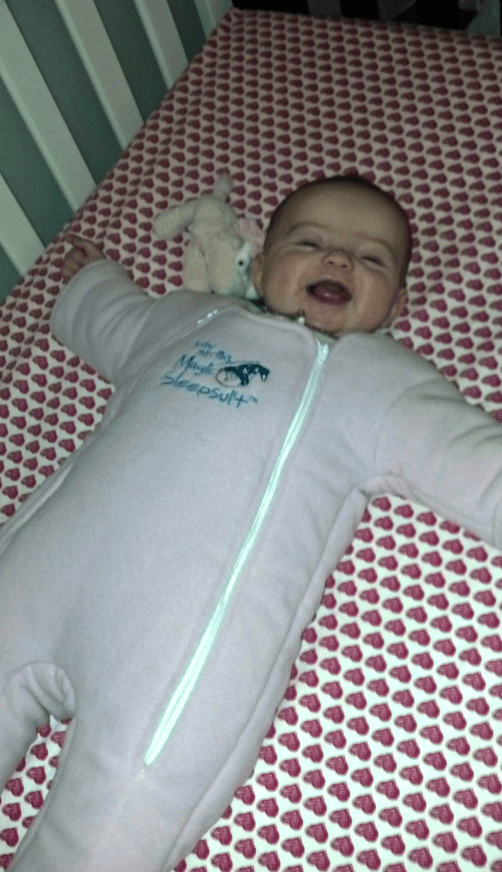
Don’t just assume that the swaddle won’t work for your baby. Try something new over and over. A for your friends to borrow their swaddles – there are so many different swaddles to try – go ahead and see what works best for them!
Practice Makes Perfect when it comes to baby sleep skills
The same goes for figuring out where your baby sleeps. Yes, a baby prefers the closeness of being in your arms. But don’t assume that your baby will ONLY sleep in your arms forever and ever.
After two months, think of everything as sleep as practice. Keep practicing putting your baby down drowsy but awake. Keep practicing putting your baby down for a nap in your crib. As soon as your baby gets used to sleeping independently or in different places, it can be more accessible and easier for your baby to be able to stay asleep in a different location (and, of course – don’t forget to swaddle!)
Stick with three days when nailing down nap times
Naps are tricky and take a while to nail down. For babies younger than six months, I recommend following awake times – which is the maximum amount of time that it takes before your baby gets overtired. Sometimes it’s so hard to figure out if your baby is overtired or under tired – and that’s part of the battle when dealing with short naps.
So many parents take a 2-month-old and are trying to keep them up for 2 hours since that’s generic advice that you can find online or in sleep books, but in reality, a 2-month-old baby may only tolerate 1.5 hours before becoming overtired. So the baby fights the nap and then ultimately takes a short rest and the parents become more and more frustrated…
Give yourself three days before changing the timing of a nap. So if you’re planning on putting your baby down at 1.5 hours after being awake for the day – try it. The first nap of the day is always easiest to get – so go ahead and play with the timing of that nap first – to try and find the sweet spot. Your baby could even surprise you with a nice long nap as a thank you!
Sleep Training Requires The Most Patience of All
Sleep training or teaching your baby independent skills will test the patience of any parent. Trust me, if I had the magic pill to have the quickest results – I would give it to you. Pixie dust, magic sleep pills, and fairy dust doesn’t exist. For some parents, success comes quickly, and for others, it’s not as easy.
According to many sleep experts, including Dr. Mindell and Dr. Ferber, all methods can work but stick to a plan is what counts. According to the sleep task force of the 52 sleep studies examined in the review, 49 showed positive results, with 82 percent of the infants and young children benefiting significantly from sleep intervention.
Now sticking with a plan and following through is easier said than done.
In working with hundreds of parents, I’ve seen the progress varied just like the children themselves.
Take Liv, an 8-month-old classified as a “high-needs” baby, getting up every 20-75 minutes each night. Her success was almost instantaneous – once she learned how to fall asleep independently. More about her success story can be found here.
Consistency isn’t always easy – but working consistently is what gets the job done.
My philosophy is to focus on your sleep training attempt and keep things consistent for one week. In that one week, things will be hard. Way harder than you want them to be. But you have to focus on success and results.
Your baby falls asleep independently. Celebrate it.
Your baby wakes up for only a minute and falls asleep on their own – jump for joy.
Focus on any minor victory and keep focusing on the progress, especially to get you through that first week.
Just one week – that needs to be your first goal. And once you get through that first week, give it another week before giving up. Your progress will even astound you, and you might just have a great sleeping baby!
Mistake #3: An Overtired Baby Builds A Sleep Debt That’s Hard To Dig Out Of
Sleep begets sleep. If you’re not familiar with that parenting mantra, it means that a rested child sleeps better and longer than an overtired or chronically sleep-deprived child.
The need for sleep is fueled by more need for sleep.
Often I hear “my baby is soooo tired, but just won’t sleep”. I know that this statement shows me that your baby is overtired without the proper independent sleep skills.
Your baby isn’t playing you…
Your baby isn’t trying to play tricks…
But your baby is sooooo tired that they just can’t fall asleep or stay asleep.
Many babies require an adequate amount of sleep to continue in a rested state which is shown below:
Now, averages are exactly that – averages. But when your baby or toddler isn’t getting enough sleep, focusing on asleep amounts is a good starting point.
Physical signs your baby isn’t getting enough sleep:
- Crying/Fussiness
- Rubbing Eyes
- Hyperness
- Lack of Focus
- Tantrums
- Difficulty – Feeding/Latching
- Yawning
- Jerky Movements
How to combat overtiredness?
According to an article on madeformums.com, “The simple way to avoid overtiredness is to ensure your baby is settled to sleep according to the awake times for her age.”
Think of putting your baby to sleep before your baby exhibits overtired signs in addition to focusing on these other factors.
- Incorporate a consistent, quality-filled pre-bedtime or nap routine (think of the 3s – short, sweet and see ya!)
- Sleep in an environment conducive to sleep
- Focus on age appropriate awake times
- 4 Months: 1.75 Hours Max
- 6 Months: 2.5 Hours Max
- 8 Months: 3 Hours Max
What is a Sleep Debt
Your baby will exhibit a sleep debt as they aren’t getting the amount of sleep that is required. The more sleep they are missing, the bigger the sleep debt which could lead to mental and physical fatigue.
Two studies show that with babies at 8 weeks and 12 weeks, the sleep deprived babies needed to be awoken with louder blasts of white noise than those babies that were well-rested. This shows us that in an overtired state, our baby isn’t functioning at their best.
Once you’re trying to fix sleep, you don’t just automatically catch up – you have to dig your Way out of the debt, slowly, but surely.
Think of when you lose weight – you don’t just lose 20 lbs. In a week the weight slowly comes off through healthy changes in both diet and exercise. In this example, the more and more weight you lose the better and healthier you feel. Same goes for your baby. The more sleep your baby gets, the better your baby will feel!
How to get caught up once you’re sleep deprived
Once parents realize their baby isn’t getting enough sleep, it’s always hard to focus on the recovery to get back to the adequate amount of sleep to meet their own sleep needs.
TheMilitaryWifeandMom.com states “Nighttime sleep is the most restorative, so I always try to prioritize getting nighttime sleep in order first. It is definitely possible to try getting back on schedule with naps and bedtime all at the same time.” I also agree that focusing on nighttime is the first place to start to try and optimize total sleep.
Since the sleep changes are slow and gradual, you have to give it time and keep going to see the changes.
Mistake #4: Lack Of Sleep Can Endanger Your Baby
Sleep deprivation is a real problem that parents have to deal with. A sleep study commissioned Silentnight bed company found that parents have a deficit of 6 months of sleep in their children’s first two years – leading to mood swings, depression, and devastating effects on relationships with a third of new parents admitting to arguing at least five times a week.
Another more recent study shares that parents lose almost 6 weeks of sleep in their first year of life – equating to only 5.1 hours of total sleep per night.
Despite the 1950s where parents were able to get 8 to 9 hours of sleep each night, The C.D.C. found that only 8 percent of people reach that nine-hour mark now – 63 percent of people are sleeping seven or eight hours, 21 percent are around six hours, and 8 percent are even less.
While as a mom, it’s no surprise that parents are getting so little sleep – it’s a question about how long parents can continue under such sleep-deprived conditions.
The consequence for sleep-deprived parents is NO JOKE
Sleep deprivation can cause physical, emotional, and mental symptoms. All combined, the dangers are pretty scary for parents that are just trying to survive. Very scary.
Sleepless driving is dangerous
Driver fatigue is one of the biggest single causes of auto vehicle deaths in adults.
Approximately 60 percent of adult drivers – about 168 million people – have said they’ve driven a vehicle while feeling drowsy, according to a survey conducted by the National Sleep Foundation. And more than one-third of people have fallen asleep at the wheel.
Unfortunately, many of these results in death every year, with The National Highway Traffic Safety Administration reporting that around 100,000 police-reported crashes are a direct result of driver fatigue, and the true number is likely to be much higher.
The Institute of Medicine estimates that 20 percent of all motor vehicle accidents are attributed to drowsy driving. This means that driver fatigue causes approximately 1 million crashes, 500,000 injuries, and 8,000 deaths in the U.S. every year.
Auto accidents are the single highest cause of death in children and young adults. So, it’s crazy for any parent to consider driving while feeling fatigued and exhausted. It’s shocking how driver fatigue is a rolling death trap.
Driving sleep-deprived is like being impaired by alcohol
If you’re still not convinced on the dangers of driving – a study showed that after prolonged periods of sleep deprivation, performance levels reached an equivalent to someone with a blood alcohol limit of .1%, above the legal limit in most states. In addition, response times were 50% slower, so accuracy, while driving and stopping, are all at risk in a sleep-deprived state.
Imagine being on the road with parents who are 50% less likely to respond in a normal state for really important things for driving – like driving accuracy and being able to brake quickly? It’s really scary to think of what could happen.
Sleep Affects Productivity in the Workforce
Being sleepy is moving from the home and into the workforce, with sleep deprivation taking its toll.
Almost a third of employees report that daytime sleepiness interferes with daily activities, according to a 2008 National Sleep Foundation poll. And it’s not so simple to “sleep when the baby sleeps,” especially when you are in an office.
Sleepiness also affects concentration, handling stress, listening, decision making, and problem-solving as well.
Companies are paying more for sleepy employees
Being sleepy doesn’t just affect companies with poor performance – it also results in costing a significant amount of money.
The data from an appraisal conducted by a major corporation – indicates that 30% of the employees reported getting six hours or less sleep per night – less than the allotted 8-hour recommended amount. These statistics are staggering to the company’s profits – with the lost productivity hours yielding a $6 million productivity loss a year for a company with 10,000 employees.
If it were so easy, we should focus on keeping our employees sleeping well to rid all the problems in our world today.
Sleep Programs are now Employee Benefits
Thankfully, companies are starting to understand the importance of health and well-being of their employees and the future of corporate wellness programs are increasing. According to the IBISWorld Industry Report, the growth of corporate wellness programs are anticipated to increase 7.8% each year through 2021, from today’s estimate of an $8 billion industry.
Wellness programs are more than just yoga classes and in-office massage. Now, companies are trying to differentiate themselves and retain talent by offering unique employee perks and programs. Many innovative companies have even looked at helping their employees with sleep issues. This isn’t surprising since a MetLife Study showed that 59% of employees say that health and wellness benefits are important for increasing loyalty to their employer.
I’ve seen this trend first-hand. As my work as a sleep consultant, I’ve created employee benefit programs at a variety of innovative companies. One of those clients is PowerReviews, a growing tech company in Chicago, IL.
“We have to find the best talent in our industry – and being able to offer different employee benefits has been one way that we’ve been able to differentiate ourselves,” says Chief People Officer, Kira Mihelbergel. “Offering sleep services is a win-win since it’s a low-cost investment for a high return. I remember being sleep deprived as a mom of twins and it was difficult to be at my best. Now, our employees receive education and/or sleep consultations to get them back to productivity as soon as possible.”
Keeping employees as well-rested as possible just makes sense!
Unsafe Sleep Conditions
Safety isn’t just about keeping parents productive in the workforce – it’s important to focus on keeping our parents rested enough to not make a dangerous mistake at home.
Each year about 4,000 infants die unexpectedly during sleep time, from SIDS, accidental suffocation, or unknown causes. In any effort for just another minute of shut-eye, parents could risk putting their baby at risk.
The American Academy of Pediatrics (A.A.P.) offers recommendations for a safe sleep environment to reduce the risk of SIDS and other sleep-related infant deaths.
A.A.P. recommendations for a safe sleep environment:
- Use a firm mattress
- Sleep in a crib, bassinet, portable crib, or play yard that conforms to the safety standards of the Consumer Product Safety Commission (CPSC)
- The infant should sleep in an area free of hazards, such as dangling cords, electric wires, and window-covering cords, because these may present a strangulation risk
- Infants should not be placed into a bed for sleep due to suffocation and risk of entrapment
In 1994 when the A.A.P. put out the back-to-sleep campaign, the results were successful and decreased 50%, but has plateaued in recent years.
Safety should be our biggest priority for our children. The risks are too high.
Mistake #5: Feeding Your Baby To Sleep (Tanking Your Baby With Food Does Not Make Them Sleep Longer)
Feeding a baby too close to sleep time just seems intuitive. Tank your baby up with food in hopes that they will sleep an extra minute each night, especially since your baby has a small stomach.
Parents in their attempt to give their babies a more filling option have chosen to give rice-cereal in a bottle or formula – studies do not show a link to either of those working. In fact, the opposite is true.
A study led by Kathleen Kendall-Tackett, Ph.D., studied the sleep patterns of 6,142 mothers of 0-12-month-olds and the result showed us that women who are breastfeeding slept more and were in better mental and physical health than those parents of mixed or formula feeding babies.
Rice cereal isn’t the go-to first food
Rice cereal used to be the go-to first food recommendation among pediatricians – especially since the rice has such a bland taste. But since the F.D.A. warned about high arsenic levels in rice cereal, the recommendations have been changed. Increased exposure for babies exposed to high levels of arsenic has been linked to learning problems. The F.D.A. still recommends iron-fortified cereals as babies first food, but there are better options, such as rice and barley.
What happens when a baby gets fed before nap or bedtime
So many parents have a bedtime or nap routine that looks like this:
- Change Diaper
- Bottle or Nurse Baby
- Put Baby Down (Punch-Drunk Drowsy or Pretty Much Sleeping)
But in the above scenario, your baby doesn’t have the skills to get back to sleep when they wake up. He may be waking to look for that full sensation from the food right before bedtime.
One easy Way to combat needing food to sleep is disassociating food and sleep! For a younger baby, it could mean that you feed at the front of your routine and then have a couple of quality steps like a book and song right after.
Older babies (6 Months+) you can feed outside of the bedtime routine altogether, and you can feed right before entering your baby’s room. No full stomach could lead to longer stretches, but you have to try!
Mistake #6: Blaming Anything Else On Why Sleep Sucks (A.K.A. Pointing the Finger on Teething, Wonder Weeks, and Regressions)
All parents need to know that there are always changes in baby sleep. I like to think of baby sleep as a wild roller coaster with lots of ups and downs and ebbs and flows – this will always keep parents on their toes, doing their best to enjoy the ride.
Typically fluctuations in sleep patterns are completely normal during the first few years of life – and normally not a concern.
There are many reasons why your baby isn’t sleeping well and understanding why is usually only half the battle, but below is the list of the most common reasons for disturbed sleep.
- Sleep Regressions
- Developmental Periods (including growth spurts, new skills or words)
- Teething
- Sickness
- A Bad Habit (finally rearing its ugly head)
- Messed Up Schedule
- Overtired State
- Vacations Messing Up Sleep
- Asserting Control (especially for preschool-aged children)
According to the Family Sleep Institute, a sleep regression is a cognitive, physical and/or emotional development that disrupts your normal sleep patterns. 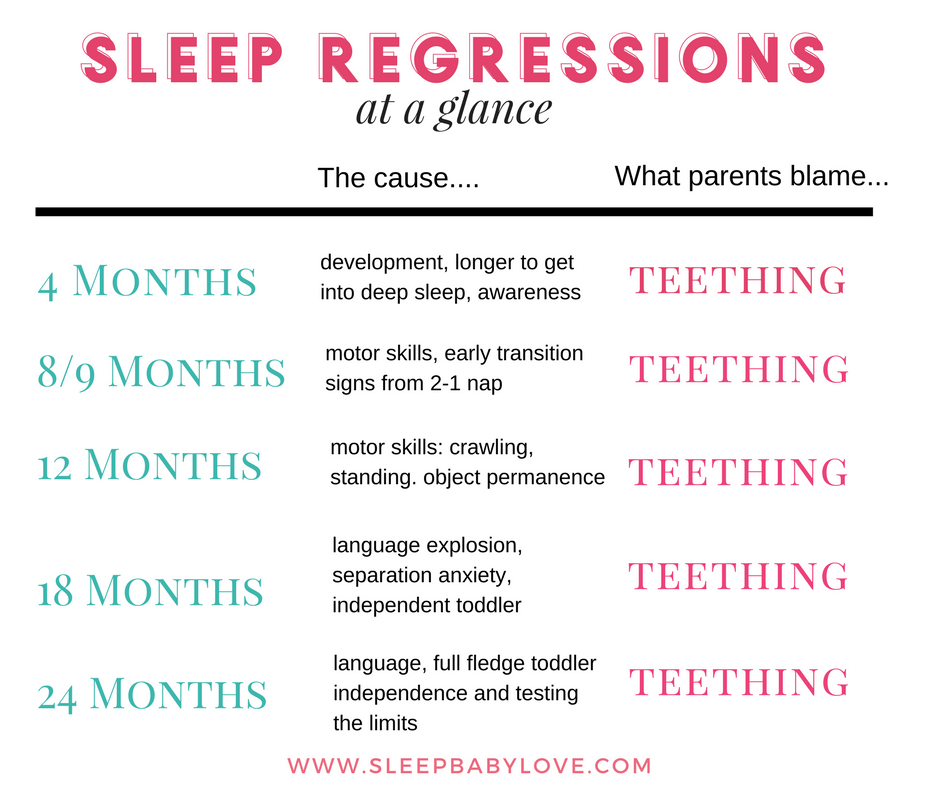
A typical sleep regression hits around the 4th month, 8/9 months and 2-year mark – typically correlated with baby’s developmental milestone.
4-Month Sleep Regression: The 4 month sleep regression is typically the first time you see a dip in sleep (especially if your child has been a decent sleeper in the first place). At 4 months, your baby’s sleep becomes more adultlike and takes longer to get into deep sleep. Plus, your baby becomes more aware and short naps affect your baby’s overall sleep.
8/9-Month Sleep Regression: Your baby starts to grasp the reason for object permanence and starts going through separation anxiety causing your baby to miss you more.
2-Year-Old Sleep Regression: The oh-so-fun 2-year-old sleep regression is typically associated with your toddler asserting control and fighting sleep more and more.
How long is a sleep regression?
A true sleep regression should only last for a couple of weeks. If your baby’s sleep is affected longer than that, your sleep regression might actually be more than a sleep regression but a friendly reminder to focus on healthy sleep habits such as sleep environment and independent sleep skills.
What are Wonder Weeks And Why Do I Keep Hearing About Stormy Periods?
Wonder Weeks are the signature term from the site wonderweeks.com which sells books, milestone journals, diaries (found here).
Similar to what you just learned with sleep regressions, there are developmental changes that occur in your baby’s life – but what is cool is that Wonder Weeks have correlated these weeks into 10 predictable changes associated with certain weeks called leaps, typically correlating to fussy periods.
The leaps are below and associated with the certain week after estimated due date (not the actual birthdate.)
- Mental Leap 1 – The World of Changing Sensations – Wonder Week 5
- Mental Leap 2 – The World of Patterns – Wonder Week 8
- Mental Leap 3 – The World of Smooth Transitions – Wonder Week 12
- Mental Leap 4 – The World of Events – Wonder Week 19
- Mental Leap 5 – The World of Relationships – Wonder Week 26
- Mental Leap 6 – The World of Relationships – Wonder Week 37
- Mental Leap 7 – The World of Sequences – Wonder Week 46
- Mental Leap 8 – The World Of Sequences – Wonder Week 55
- Mental Leap 9 – The World of Sequences – Wonder Week 64
- Mental Leap 10 – The World of Systems – Wonder Week 75
Some parents swear by the accuracy of the Wonder Weeks and how it was spot-on for their baby – like drop dead accurate. Others loved that they had a guide to follow that explained good days and bad days.
On the other hand, you have moms scratching their head wondering Wonder Weeks work for their own baby? Especially as mom Elise describes “His good days always seem to fall within leaps and bad days can often be in the supposed good patches! Is it just me? I wish it worked for us so his bad days had an explanation!!”
My thoughts are that similar to regressions; Wonder Weeks are a great guide. It’s even great to get more detailed on what’s going on and what to expect – especially since you can actually blame something for clingy and fussy periods.
But the general consensus is that babies just don’t fit into a developmental box, and that timing, temperament and external factors, such as sleep hygiene will make a difference in how a baby acts.
Is Your Baby Teething?
Anytime sleep schedule has been disrupted, or my baby got cranky, the go-to answer was always “blame teeth.” I was even “that” mom who said at 2 months of age my baby was getting her first tooth since she was cranky and had drool. (Yes, I was disappointed that her first tooth didn’t sprout until several months later.)
Teething is real, and teeth do come in. But, newsflash: your baby will be growing primary teeth from 6 months to 3 years – when finally all 20 primary teeth come in. This shows us that we can’t blame teeth for the reason that things are off forever. It also shows us that we can’t wait to work on sleep until a tooth pops since many more teeth are following right behind.
This Slate article talks about how teething causing excruciating pain is actually a myth, citing that gums move out of the Way when a tooth pops through. Plus, gums don’t bleed! While Dr. Jones, a pediatric and newborn hospitalist believes that a baby might be in pain or in a bit of discomfort, he believes a significant amount of pain is unlikely.
My baby is sick – what can I do about sleep?
Sickness is one of those areas unlike teething that it’s important to take a pause from your sleep routine. Do what you can do to make your baby feel good, especially since your baby is probably feeling icky and not comfortable while the sickness is taking its toll.
According to Dr. Cindy Gellner, a board-certified physician specializing in pediatrics, in her talk on University of Utah Health Radio, “Babies, toddlers and preschoolers get about seven to eight colds a year. And during school age, they average five to six colds a year. And in addition to colds, children get the lovely diarrhea illnesses, with or without vomiting, two to three times a year. Some children tend to get high fevers with most of their colds or they have a sensitive tummy and develop diarrhea with the cold symptoms.”
Dr. Gellner also makes it clear that despite all your best efforts to sanitize and clean, your child will still probably get sick since there are over 200 different virus strains that your child needs to build immunity towards.
How Can You Comfort Your Baby Without Totally Bagging Sleep?
Do sniffles constitute a true sickness? Colds occasionally lead to bacterial infections such as ear or sinus infections which require treatment with antibiotics, but it’s also possible that your baby is not affected for more than a couple of days. I personally continued on with my sleep routine, EVEN when my baby just had a light cold. A cool mist humidifier in a baby’s room and a saline solution in your baby’s nose is a great tool to get the snot away.
Keep Your Baby Comforted. WebMd.com shares tips to keep your baby comforted while illness runs its course:
- Dry your baby thoroughly afterward to prevent chills.
- Keep your infant’s head slightly elevated to make breathing easier.
- Give your sick baby lots of love and attention.
- Hold her and engage in quiet play, give her an infant massage, or read and sing to her.
Once your baby’s sleep has been negatively affected, figuring out to get back on track is half the battle:
- Focus on independent sleep skills while picking a soothing method you are comfortable with.
- Recovering Good Sleep Habits After Being Sick can take a few days while your baby’s sickness leaves their system. Expecting night wakings and providing support is an easy way to get back on track.
Mistake #7: Using Sleep Props or Sleep Crutches To Get An Overtired Baby to Sleep Justs Get In The Way
In a parent’s desperate attempt to help their baby get a minute more of sleep, many will do ANYTHING it takes to get that last minute of shut-eye and try any product on the market.
What is a sleep association?
According to MyBabySleepGuide.com, a sleep association is something that a child associates with falling asleep. I would take that definition a step further and say that a sleep association is anything that your baby can’t fall asleep without.
Anything can be a sleep association if your baby needs it to fall asleep such as:
- Rocking/Swaying
- Swaddle
- Bed-Sharing (being in your presence)
- Holding
- Nursing
- Bottle Feeding
- Bouncing
- Driving-Motion
- Swing
- Rock-N-Play
- Attachment Object (Blanket/Lovie)
- Pacifier
- Baby Wearing
Not all sleep associations are created equal (or the difference between a good and bad sleep association)
Sleep associations only become “bad” when they get in the Way of great sleep. An easier way to know if a sleep association exists is if your baby can’t “stay” asleep after going to sleep in a certain way.
For example: If your baby is nursed to sleep and wakes up 20 minutes later needing you to nurse them back to sleep – nursing is a sleep association.
If your baby is dependent on a pacifier and wakes up every 2 hours needing that pacifier to be replaced by you each and every time – my friends, that’s a negative sleep association.
You can’t spoil a baby and create bad habits as a newborn.
Don’t worry about creating habits within the first two months of your baby’s life. Your baby is just a newborn and can be expected to act like one with fragmented nights and multiple feedings throughout the day.
During this time pretty much all the sleep associations may be used and it doesn’t mean that you are going to nurse your 4-year-old to sleep.
Babywearing is one Way that parents found the comfort of toting their newborn while getting things done around the house or tending to other children. Medical professionals suggest that infants thrive through touch, so wearing your baby is another way to meet that need.
Sleep issues may rear their ugly head
Around the 4-month mark when sleep consolidates, and your baby becomes more aware, you may find that the sleep associations that worked beautifully to get them to fall asleep may not help your baby “stay asleep.” Short naps and frequent night wakings can become quite the headache.
A problem isn’t a problem until it becomes a problem.
You never need to fix a problem until it’s a problem.
But when you are desperate for long naps and longer stretches of sleep, you have to take a look at your baby’s sleep associations to see what can be reduced or minimized to lessen your baby’s association with you (or anything that is helping or hurting sleep).
Early Sleep Problems Can Be Later Sleep Problems
There are several long-range studies regarding childhood sleep habits and the effects into adolescence and adulthood. For example, one study in Montreal among 987 parents demonstrated that early sleep problems in 5 – 17 months continued for older children between 29-40 months. This study showed that certain habits such as mother present at sleep onset or giving food/drink after child awakens due to sleep difficulties led to disturbed sleep such as bad dreams, taking longer to fall asleep, and disrupted sleep.
Sleep Affects Future Obesity
There are other studies that demonstrate the effect of sleep as it relates to obesity rates. A British study demonstrated those that have less than 10.5 hours of sleep at age 3 have more than a 45% chance of becoming obese by age 7. Another study from Elsie M. Taveras, examined sleep duration starting at 6 months. Elise found that sleeping less than 12 hours per day was linked to future obesity rates.
Prevent Bad Habits To Prevent Future Problems
I teach from overcoming my two girls’ personal sleep struggles. In case you didn’t know, it’s because of my second daughter that I’m a sleep consultant. I had to overcome plenty of toddler sleep struggles which allows me to confidently say that I’ve been in your shoes and you will get through this!

The best Way that I can describe the Way I parent is that I am always preventing bad habits. I like to think of my child’s as a big boat barreling in the sea. Sure, we hit some rocky waves and go through periods where I’m getting knocked around a bit. But, I will NEVER allow my child’s sleep boat to tip over because it’s way too hard to recover when you’re in a flipped boat in the sea.
Yes, that means that I don’t allow my kids to come into my bed and I don’t stay with them to fall asleep. But that doesn’t mean that I love them any less.
I know I’m not alone in my discipline to prevent future issues from happening.
Dr. Elsie Taveras of Harvard Medical School, was quoted in a Time Interview-“…if you approach [sleep] differently — ‘I am not even going to start my child making these sleep associations’ — it’s much easier to prevent [future problems].”
If you’re reading this and have yet to have the issues start in the first place – go ahead and feel free to know that you’re doing a great job and to keep doing what you’re doing!
Mistake #8: Not feeling comfortable teaching independent skills
According to the 2015 State of Motherhood report, 83% of babies being born are from moms born 18 to age 32, coined as the “Millennial Mom.” This breed of moms spend $13k per year on spending for their kids, always have a smartphone in hand and typically find parenting exhausting, but fun.
I don’t remember spending this much money for my kids, but hey, things add up! I got in trouble buying the newest shiny object from Target.
MotherMag.com summarized the study “Perhaps due in part to the rise of social media, 64% of moms say that parenting is more competitive today than it used to be, with 3 out of 4 admitting that it’s important to try to be a “perfect” mom. Interestingly, that number is higher among stay-at-home moms.”
With new moms striving for perfection, it’s pretty easy to assume that parents are pretty disappointed when their baby doesn’t sleep well.
The act of self-soothing, or allowing a baby to fall asleep independently is easy for some and not for others. While some parents have that unicorn baby that sleeps and eats perfectly, there are other parents that are dealing with a baby that is up every hour on the hour, needing help to get back to sleep. ALL. NIGHT. LONG.
When parents come to me for a sleep consultation, the exhausted parents are typically at the point where they have failed at gentler or preventative sleep measures, and they are looking for help creating sleep a sleep plan and receiving ongoing support.
But what if we could believe that our babies had the ability to learn independent all by themselves? Would parents feel more confident letting them self-settle even a bit more?
Newborn Behavioral Observations – Helping Babies Communicate
Dr. Nugent, the director of the Brazelton Institute at Children’s Hospital in Boston, created Newborn Behavioural Observations (N.B.O.) system, a relationship tool that can help parents see what their little baby is trying to communicate.
As quoted in the Irish Times, Nugent saw so many anxious parents and wanted to make the knowledge of N.B.O. accessible to them so that they could “pull back and enjoy their babies.”
Mindset Shift is what parents need
When helping parents come up with their own sleep plan, many times I move from sleep coach to therapist. Many moms (especially exhausted, sleep-deprived moms) feel that not running to every peep makes them a bad mom. Part of my “therapy” is changing the negative thoughts into positive, especially when parents realize that things can’t continue the Way they are. 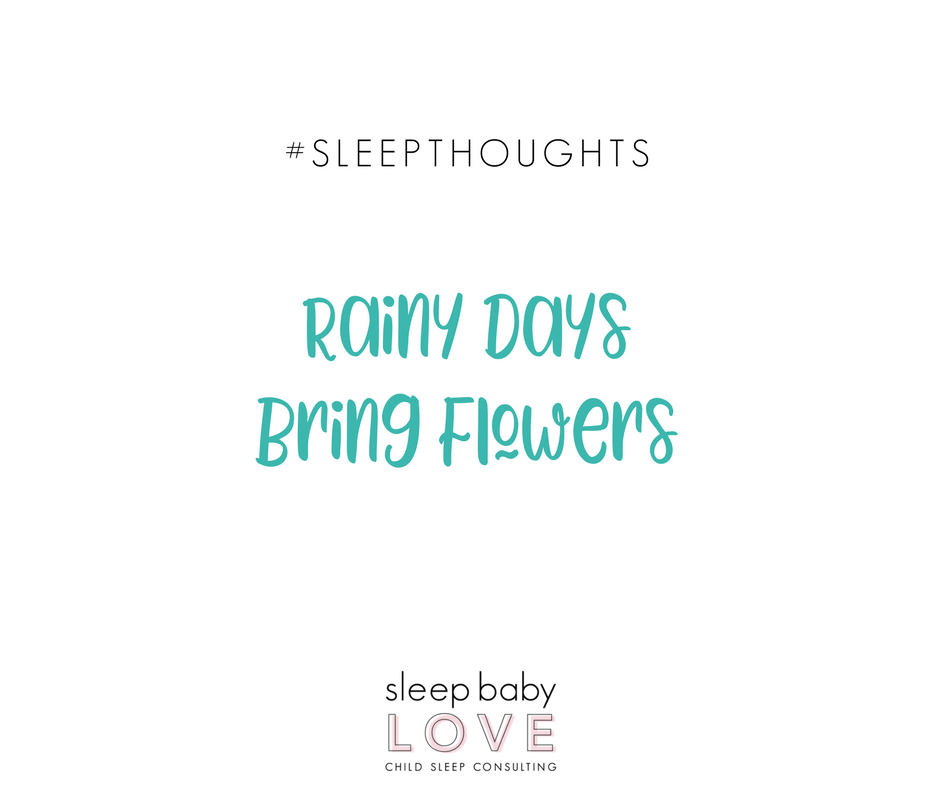
Rather than thinking about the negative, think about the positive.
Just your mindset alone can help re-frame how your baby is feeling:
Thoughts in your mind:
- My baby is alone, suffering or scared
- I need to respond to every cry
- I need to go help my baby
Changing your mindset:
- I am giving my baby a great skill that will help her grow independent and strong.
- I am my baby’s teacher, and I am choosing to teach her the great skill of sleep.
- I can give my baby time. My baby is capable of more than I know.
The mindset shift is that our babies are capable of Way more than we think.
Nina from Sleeping Should Be Simple explains “Our job isn’t always to save them from every discomfort, but rather to equip them to handle discomfort. For teenagers, this might mean giving the autonomy they need to make decisions, while for babies, it can be as simple as waiting a minute before we go in.”
Challenges = growth
Rather than thinking about challenges as a negative, think about the positives of what can happen. Sometimes it’s just the hardest part to actually prepare or do good.
Matthew Melmed, Executive Director, ZERO TO THREE is quoted in JanetLanbury.com “Recognize that challenges and stress are a natural and important part of a baby’s growth. The ability to manage stress and muscle through challenges builds self-esteem and self-confidence.”
There are many times in our child’s life that we want to swoop in. But, sometimes taking a step back is actually in our child’s best interest.
Search the Internet, and there are hundreds of success stories about sleep. You can even see my own personal testimonials of people feeling that I changed their own lives. (Literally – this was a quote from Karen after we helped her 10-month-old boy sleep through the night: “Susie literally changed my life”.)
I see time and time again that it’s much harder for the parents to start their plan. Some babies don’t even fuss for more than a few minutes. Unfortunately, that’s not everyone’s experience, but as long as your expectations are set appropriately, you will be successful.
Some babies are naturally good sleepers, and some parents do work to make sure that good habits are formed early – Like the amazing letter I received from Jacqueline about her cutie patootie baby girl, Anabel.
“I see how so many parents are afraid that they will not have a loving close relationship with their child if they “sleep train.” I never trained! I was just consistent from day one with a routine/pattern to life and sleep and trusted little consistent moves would get me there. Anabel never cried it out or had to do gradual extinction. Sleep teaching from the beginning has made all the difference.”
Regrets about NOT Sleep Training
Sleep training is a very personal decision and only when parents are ready should a sleep training attempt ever be made.
There are parents out there that regret not sleep training their baby and/or regret the decision that they didn’t teach their baby independent skills earlier such as this mom who shared with me on Facebook.
“I regret not putting it into effect so much earlier. Sleep training saved us AND her. Once we fully committed, it was the best decision we ever made. I desperately wish we did it earlier.”
Sleep Training Works As Long As You Have A Solid Plan:
Sleep Training Is NOT about letting your baby only cry – it’s about so much more…
Sleep Training is NOT about saying “hey, let’s give it a try” and see what happens. It’s so much more than that.
Sleep Training I.S. about coming up with a plan that you feel you can stick with.
How To Come Up With A Sleep Training Plan:
Step 1: Talk To Your Partner: You must be on the same page.
Step 2: Set Your Goals: Not every baby or family have the same goals. It all depends on what you want your baby to accomplish. Understanding what’s age-appropriate and what you are expecting – this will help make sure of that.
Step 2: Pick The Soothing Method: I have a handy-dandy cheat sheet that can help determine which method will work best for you.
Only once you are ready and feel like you have appropriate accountability and support do I recommend starting. But once you see amazing success, it really can be amazing!
Conclusion:
Getting an overtired baby to sleep isn’t easy, especially since the answer isn’t always cut and dry! But, realizing if you’re making any of these top mistakes can be a good first step. Once you realize your baby isn’t getting enough sleep or has negative sleep associations (or is making any of the other mistakes), you can start your plan with getting sleep on track!
Don’t think you can do it alone? You can always hire me to help you come up with a plan with accountability to keep you successful. I am your biggest fan!




